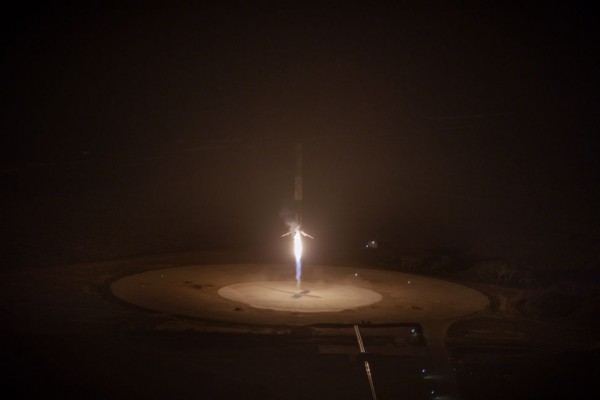By Ana Verayo, | January 13, 2016

The Falcon 9 rocket lands safely for the first time last December after launching ORBCOMM satellites.
Another historical rocket landing is scheduled this Sunday, January 17 from SpaceX, involving a satellite launch, according to numerous media outlets. The private space company hopes to land its first stage of the Falcon 9 rocket, after launching the Jason-3 observation satellite into lower Earth orbit.
Like Us on Facebook
The first stage of the two-stage Falcon 9 rocket is slated for a soft touchdown on an autonomous floating droneship off the coast of California from the Vandenberg Air Force Base. Space journalist Charles Lurio first revealed this news on social media via Twitter and was later confirmed by NBC News.
This is not the first time SpaceX have successfully landed a rocket vertically on land, after a space launch Last December 21, SpaceX launched 11 tiny communications satellites from ORBCOMM, making this a milestone, which marked the first time that a booster rocket landed softly, vertically after an orbital liftoff.
Watch the Falcon 9 rocket first historical landing here.
On the other hand, another private space company known as Blue Origin, also successfully landed its booster rocket earlier in November last year, however, during a suborbital test flight.
Previous attempts for SpaceX to land its rocket ended in fiery explosions where the Falcon 9 conducted a sea landing twice, once in January 2015 and a few months after in April. Both launches ended in landing failures, as the rocket stage hit its target too fast and hard, as it fell over and exploded on the droneship's deck.
SpaceX CEO and founder Elon Musk aims to develop these breakthrough refurbished and reusable rockets in the noble effort to cut spaceflight costs and for faster turnaround during launches. He believes that these reusable boosters can slash spaceflight costs by a factor of 100 as he also plans to colonize Mars when these spaceflight costs become economically feasible.
SpaceX's upcoming satellite launch involves the Jason-3 which is specifically designed to obtain measurements of global sea level variations that are more precise than previous satellite data technology, allowing scientists to better understand the continuous effects of climate change and global warming.
The mission will also involve adding more crucial observations adding to the datasets that has been accumulating since 1992, after the launch of the TOPEX/Poseidon mission. The Jason-3 mission is a collaborative effort of NOAA (National Oceanic and Atmospheric Administration) and EUMETSAT (European Organisation for the Exploitation of Meteorological Satellites), NASA and French space agency, CNES (National Centre for Space Studies).
-
Use of Coronavirus Pandemic Drones Raises Privacy Concerns: Drones Spread Fear, Local Officials Say

-
Coronavirus Hampers The Delivery Of Lockheed Martin F-35 Stealth Fighters For 2020

-
Instagram Speeds Up Plans to Add Account Memorialization Feature Due to COVID-19 Deaths

-
NASA: Perseverance Plans to Bring 'Mars Rock' to Earth in 2031

-
600 Dead And 3,000 In The Hospital as Iranians Believed Drinking High-Concentrations of Alcohol Can Cure The Coronavirus

-
600 Dead And 3,000 In The Hospital as Iranians Believed Drinking High-Concentrations of Alcohol Can Cure The Coronavirus

-
COVID-19: Doctors, Nurses Use Virtual Reality to Learn New Skills in Treating Coronavirus Patients







